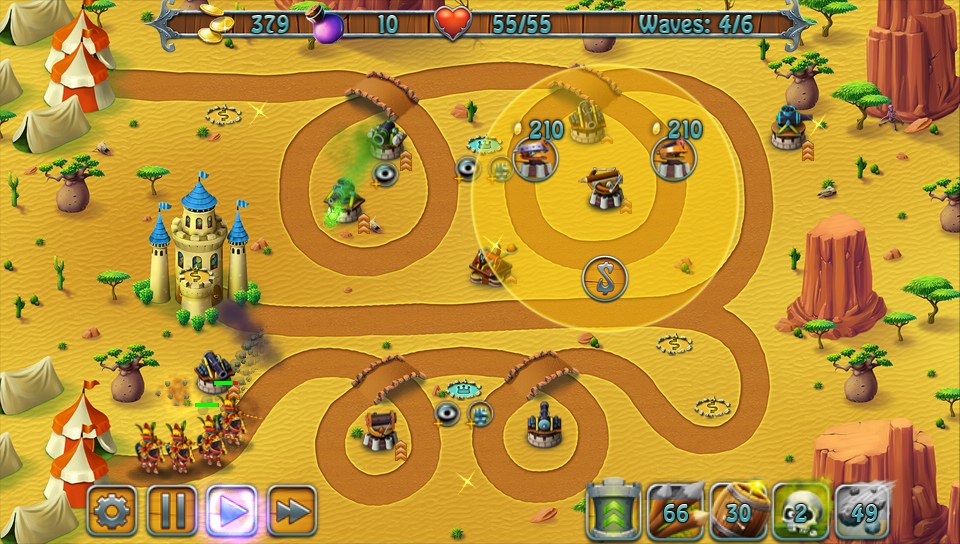The PlayStation Vita is going through an identity crisis right now. It’s increasingly becoming a platform for cross-buy titles, niche Japanese games, and a slew of mobile ports. Very few games are developed with the Vita in mind and making use of the systems functionality is often an afterthought. Without a firm path laid out for its future, Sony has left many gamers in the lurch as to what they should expect out of this powerful (yet consistently underutilized) system.
I always appreciate small developers getting their hands dirty on such a risky platform like the Vita. After all, if the PlayStation Blog is any indication, Vita owners are incredibly picky; a demanding bunch that either want AAA-titles or the best in what the indie community has to offer. So when an unremarkable game like Medieval Defenders comes along, you get that sinking feeling that it doesn’t stand a chance of success.
The Road Most Traveled

Medieval Defenders is the prototypical tower defense game, where players invest in defensive weapons to protect their base from the enemy horde. Each new wave increases the number and variety of the opposing force, making players adapt to their new environment on the fly. As the level progresses, you’ll pick up gold by killing off your foes or by selling off existing towers. You can then choose to upgrade towers or buy brand new ones that can provide their own set of benefits in battle. Some towers handle different situations better than others, especially in later levels where some units are immune or can even disrupt your towers’ actions. By all accounts, though, Medieval Defenders sticks to the script of the tower defense genre, never deviating from the original formula.
At the end of each level, players are given a star rating based on how many enemies reached their base. However, the real draw are the elixirs, which act as a secondary currency that you can earn through doing well on a level or buy outright from the PSN store. Elixirs can grant you access to special tower placements on the map as well as bonus upgrades that carry across your playthrough. These permanent upgrades (like extra gold per enemy killed or decreased upgrade costs) will come in handy with some of the uneven difficulty spikes in the game. It isn’t surprising that a title with mobile gaming roots supports micro-transactions, but with enough dedication (a.k.a. grinding) one can get these bonuses without spending any extra money.
As is the case with most mobile games out there, Medieval Defenders uses a very inoffensive, standard-issue iOS/Android art style that simply lends nothing to the appeal of the game. Waves of troops will march along, some indistinguishable from others, and eventually even your towers will be hard to tell apart despite having different abilities. Honestly, I’m surprised Kate Upton hasn’t done a commercial for it yet. It is void of any originality or variety; whether we’re talking about the level design, gameplay mechanics, or the music. If you want to see the same maps, kill the same units, and listen to the same, uninspired tunes again and again, look no further than this game.
Touch and Go
[imagebrowser id=1371]
With the PlayStation Vita’s touch controls, it’s easy to conceive that any iPhone game could be ported over with little need to update the interface. Medieval Defenders solely utilizes the Vita’s touchscreen for every game function, from pressing virtual buttons to placing towers on the map. It is a simple interface that makes playing a tower defense game quick to interact with. If there ever is the need to sell off a tower to upgrade an existing one, you’re just a few taps away…or so you’d think. Actually, it might be more than a few taps as the responsiveness of the game is questionable at times. I found myself repeatedly tapping away to buy a tower with my hard-earned elixirs to little avail. As if that didn’t break my concentration enough, placing a spell on the map lead me to accidentally open up some menus that only hindered my victory.
When the controls weren’t being so imprecise, Medieval Defenders also seems to suffer from periodic screen lag. On occasion the game will hitch up, breaking the otherwise steady flow of animation up. Games like Pixeljunk Monsters solved issues of tiny, indistinguishable units on the Vita’s screen by zooming in on the combat and allowing you to scroll around the battlefield. While far from a perfect solution, even that would have helped eased the woes of war.
Medieval Defenders boils down to nothing more than an unremarkable mobile port. As tower defense games go, it is a paint-by-numbers affair, offering little to veterans of the genre aside from another game to conquer. Stylistically, the game looks just like any number of mobile phone games out there, taking few if any risks to make it stand out in the crowd. At its current price of admission, $7 seems like a bit much for a game that you’ll play once or twice and never think of ever again.
Review copy was provided by the publisher. For information on scoring, please read our Review Policy here.
-
Classic tower defense gameplay
-
Plenty of levels to challenge
-
Touchy touch controls
-
Uneven jumps in difficulty
-
Slowdown and screen lag
-
Lacks distinctive qualities








